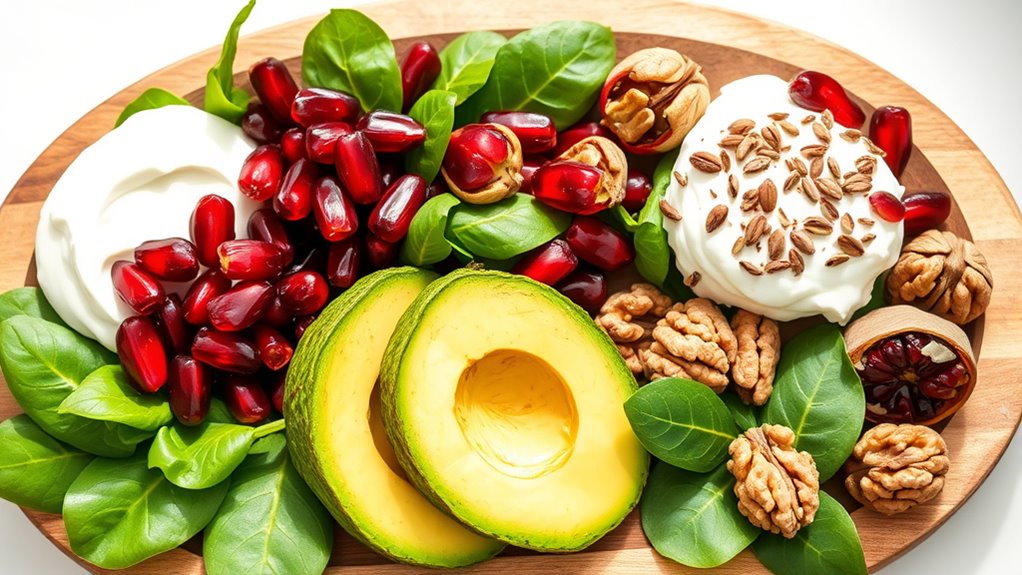To naturally balance your hormones, focus on eating omega-3-rich foods like salmon, chia seeds, and walnuts, which help reduce inflammation and promote hormone production. Include leafy greens such as spinach and kale for magnesium, essential for hormone regulation, and choose whole grains like oats and brown rice to stabilize blood sugar. Nutrient-dense foods support mood, energy, and reproductive health. Keep exploring for more simple ways to support your hormonal health through diet and lifestyle.
Key Takeaways
- Incorporate omega-3-rich foods like salmon, chia seeds, and walnuts to reduce inflammation and support hormone production.
- Include leafy greens such as spinach and kale for magnesium, essential in hormone synthesis and regulation.
- Consume whole grains like oats and brown rice to stabilize blood sugar levels and prevent hormonal imbalances.
- Add adaptogenic herbs like maca root and ashwagandha to help the body adapt to stress and balance hormones naturally.
- Maintain a balanced diet combined with stress management practices like meditation to support overall hormonal health.

Balancing hormones naturally is possible through the foods you eat every day. The choices you make at mealtime can markedly influence your hormonal health, helping you maintain balance without relying solely on medication. Incorporating certain foods known for their hormone-supporting properties can make a real difference. For instance, foods rich in omega-3 fatty acids like salmon, chia seeds, and walnuts help reduce inflammation and support hormone production. Leafy greens such as spinach and kale provide magnesium, which plays an essential role in hormone synthesis and regulation. Additionally, whole grains like oats and brown rice stabilize blood sugar levels, preventing spikes that can disrupt your hormonal balance. Practicing proper gear shifting techniques on your gravel bike can also help you manage physical stress during outdoor activities, supporting overall well-being.
Beyond diet, you can also explore herbal remedies that are renowned for their ability to support hormonal health. Adaptogenic herbs like maca root, ashwagandha, and holy basil help your body adapt to stress, a major factor in hormonal imbalance. These herbs can be added to teas, smoothies, or taken as supplements, offering a natural way to bolster your hormonal system. Incorporating herbal remedies into your routine doesn’t require much effort, and they can work synergistically with your diet to promote overall well-being. Additionally, understanding hormonal feedback loops can help you better grasp how your body maintains balance and responds to different stimuli. Incorporating nutrient-dense foods into your meals further supports the hormonal pathways that regulate mood, energy, and reproductive health.
Equally important is managing stress through meditation techniques. Chronic stress elevates cortisol levels, which can throw off your entire hormonal balance, leading to issues like weight gain, fatigue, or mood swings. Regular practice of meditation techniques like deep breathing, mindfulness, or guided visualization helps lower stress hormones and encourages relaxation. When you dedicate even a few minutes each day to meditation, you’re supporting your body’s ability to produce hormones like serotonin and endorphins, which improve mood and overall health. Incorporating mindfulness practices can enhance the effectiveness of your stress management routine. Combining meditation techniques with a balanced diet amplifies the positive effects, creating a holistic approach to hormonal health.
Frequently Asked Questions
Can Specific Foods Completely Cure Hormonal Imbalances?
You might wonder if specific foods can fully cure hormonal imbalances. While natural remedies and dietary supplements can support your hormonal health, they typically don’t offer a complete cure. Instead, they help balance your hormones over time. You should view them as part of a holistic approach, including medical advice. Remember, balancing hormones often requires ongoing lifestyle changes, not just relying solely on particular foods or supplements.
Are There Any Side Effects From Eating Hormone-Balancing Foods?
Think of hormone-balancing foods as gentle guides, not magic potions. While they usually offer benefits, they can sometimes cause side effects, especially if you have food sensitivities or take dietary supplements. You might notice digestion quirks or allergic reactions. Always listen to your body’s signals and consult a healthcare professional if you notice unusual symptoms. Balance is key—nurture your body thoughtfully, like tending a delicate garden.
How Long Does It Take to See Results From Dietary Changes?
You might wonder about the timeline expectations for seeing results from dietary changes. Typically, if you stay consistent with your diet, you can notice improvements within a few weeks to a couple of months. It’s important to maintain dietary consistency and give your body time to adjust. Everyone’s different, so patience is key. Keep tracking your progress, and with dedication, you’ll start seeing positive changes.
Can Food Alone Manage Severe Hormonal Disorders?
While food alone can support hormonal health, it often isn’t enough for severe hormonal disorders. Dietary supplementation and understanding food synergy play vital roles in managing these conditions effectively. You should work closely with healthcare professionals to create a thorough plan that combines diet, supplements, and medical treatment. Remember, addressing severe hormonal issues requires a multi-faceted approach, and relying solely on food may not provide the results you need.
Do Individual Genetic Factors Affect How Foods Influence Hormones?
Did you know that genetic variations influence how your body responds to different foods? In nutritional genetics, research shows that individual genetic factors crucially affect hormone regulation. You might find that certain foods boost your hormones or disrupt them based on your unique genetic makeup. So, yes, your genes play a significantly important role in how foods impact your hormones, making personalized nutrition essential for effective hormonal balance.
Conclusion
Balancing your hormones naturally doesn’t mean sacrificing flavor or variety. Instead, it’s about embracing nutrient-rich foods that support your body’s harmony. Imagine enjoying a vibrant salad or a hearty smoothie, knowing they’re helping to stabilize your hormones. It’s a simple yet powerful shift—choosing nourishing foods over quick fixes. When you prioritize these natural options, you’re not just fueling your body; you’re empowering your well-being for the long term.









